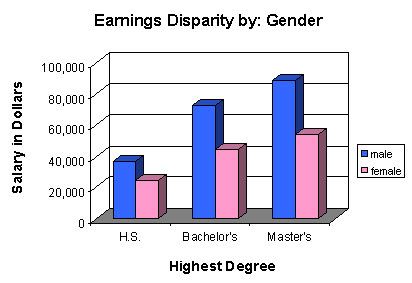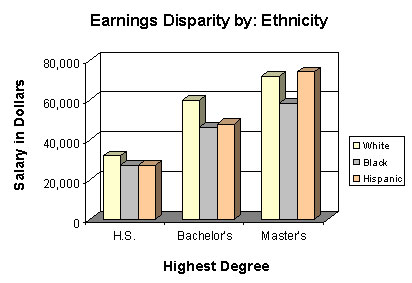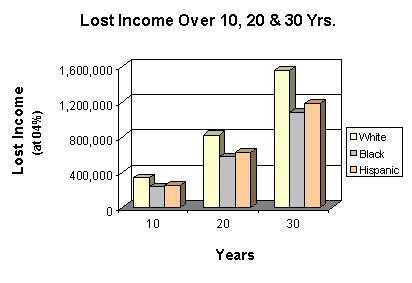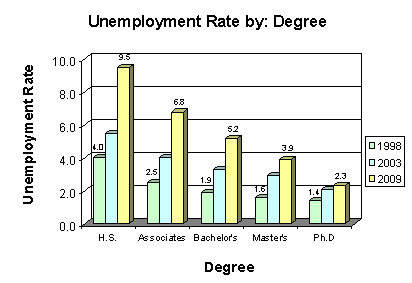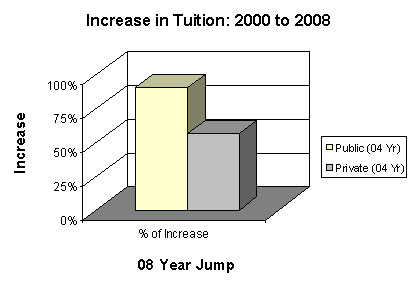
|
|
| AP home |
| my story |
| show YOU the PROFIT |
| why earn a degree |
| how we are different |
| the AP product |
| resources |
| contact us |
| Why Earn a Degree | ||||||||||||||||||||||||||||||||||||||||||||||||||||||||||||||||||||||||||||
|
There’s overwhelming evidence that the higher your educational attainment, the higher your income and the chance of being unemployed is lower. The higher the degree, the better; however, below I illustrate that bachelor degrees provide far more benefit, and are especially important to women & minorities.
The more you learn the more you earnbachelor degrees are the key to success for everyone - NationallyThe benefit of earning a Bachelor’s degree is huge. According to U.S. Census Bureau (2011 Statistical Abstract), Americans with a bachelor’s degree earned 87 percent MORE than high school graduates. And those with a Master’s degree earned 21 percent more than baccalaureates.[1] Little has changed over the years; the 2001 Abstract showed that persons holding a Bachelor’s degree earned 86 percent MORE than high school graduates; Master’s degree earned 22 percent more than baccalaureates.[2]The step-up in income, from high school diplomas to bachelor degrees, is significant; the step-up from bachelor degrees to master degrees is low by comparison. In fact, an INDIVIDUAL with a bachelor’s degree earns 17 percent more than the median HOUSEHOLD income, according to U.S. Census Bureau (Tables 228 and 689).[3] bachelor degrees are the key to success for everyone - over the centuryThe Department of Labor’s, Report on the American Workforce includes an introductory essay that outlines the progress of the American worker over the course of the 20th century. Under Forces of Change, the Bureau states that, “increased education resulted in substantial monetary payoff for the individual worker. Men with college degrees earned 62 percent more and women 65 percent more in hourly compensation than did those with a high school degree, at the end of the century [1997]. A substantial part of the growth of the economy [over the century] is attributable to increased education.[4] Your success is the nation’s success. bachelor degrees are the key to success for everyone - globally!“Education is one of the most important factors determining earnings levels” across the world, according to a National Center for Education Statistics. A degree from colleges and universities is the, "market evaluation of the economic contribution an individual makes to society."[5] I love that sentence; in non-econ speak, it’s saying that educated people, on average, boost an employer’s bottom-line, pay more taxes, consume more stuff and arguable, get in less trouble. The chart below isn’t of the best quality (see citation); essentially, “100” is the mean earnings of a high school graduate & those with a bachelor degree or higher, earn 50 percent (“150”) to 100 percent (“200”) more.

Women and minorities earn FAR less income with the SAME degreesThere are substantial differences in earnings based on gender and ethnicity. for women: degrees increase income but do NOT change the glaring disparity
according to the U.S. Census Bureau, 2011 Statistical Abstract.[6] In fact, women with master degrees earn 34 percent LESS than males with bachelor degrees. Without a doubt, these data highlight the most profound income disparity in the US. Colleges and universities are, literally, safe-havens for women.
Further, in a National Center for Education Statistics' study, Indicator 18: Gender Differences in Earnings finds that, "In the United States and the other countries . . . a large gap between male and female average annual earnings [occur] at all levels of education attainment and for all age groups."[7]
for minorities: degrees increase income and have mixed results on incomeWith bachelor degrees, Whites earn substantially more than African American and Hispanics, 29 and 25 percent more, respectively. But the disparity is far less for those with master degrees; in fact, of the three ethnicities, Hispanics earned the most (U.S. Census Bureau, 2011 Statistical Abstract).[8]
(Compared to 2001 Statistical Abstract data, Hispanics are doing a little better at the bachelor degree level, and a lot better with master degrees; however, it's becoming steadily worse for African Americans at both, the bachelor and master degree level.[9])
Bachelor degrees are worth $1,500,000 & deliver far more valuebachelor degrees are worth $1,000,000 to $1,500,000Bachelor degrees are worth $1,000,000 to $1,500,000 to whites, black & Hispanics.[10] IS $1.5 MILLION WORTH STUDYING FOR? Yes, I just shouted. This is a future value, over 10, 20 & 30 years, of lost earnings for those with a high school diploma who decide not to earn a bachelor degree.[11] The numbers & percentage are below.
bachelor degrees offer FAR more value over master degrees
according to the U.S. Census Bureau, 2011 Statistical Abstract.[12] The financial boost, from high school diploma to obtaining bachelor degree, is significant. The financial increase from bachelor to master degree in lower by comparison. Bachelor degrees are the equivalent to what high school diplomas once were; consequently, it’s what divides the haves from have nots.
The unemployment rate: be bullet proof!the higher the degree, the lower the chance of being unemployedThere’s a direct correlation between a person’s level of degree attainment and the unemployment rate. The higher the degree, the lower the rate. Below is a chart illistarting the changes over the years, 1998, 2003 & 2009. At worst, in 2009, those with bachelor degrees experienced an unemployment rate of 5.2 percent. With the sincerest respect to those unemployed, a 5.2 percent rate in the midst of an economic meltdown is absolutely amazing.[13]
The unemployment rate can change quickly. In the 1980s, it averaged over 7.3 percent; it was high in the early ‘90s (6.6) and low in the late ‘90s (4.4). The rate began to increase in early 2000 and skyrocketed by the end of the last decade.[14] But you can ‘hedge’ your success – both financially and professionally – by earning a bachelor degree. And it’s a win-win: “with the continuing advancements in technology, less-well-educated individuals may become more and more vulnerable to failure in labor market competition,” according to the National Center for Education Statistics."[15] Employers NEED educated employees.
Employers need students from colleges and universitiesEmployers need educated employees due to our rapidly changing business environment and global economy.
The cost to attend the University increases faster than inflationTuition increases about twice as fast as inflation - about 8% per year - which means that the cost of college doubles every nine years, according to FinAid.[20] And this has been true for a long long time. Back in the 1990s, the Department of Justice investigated & sued Ivy League schools & MIT for price-fixing.[21]Fidelity Investment’s provides the numbers. In their The Cost of College they write that, “college costs have increased faster than the rate of inflation” from the 1980’s to 2001. At the current rate of increase, “the total costs for four years of college could range from $95,000 for a public university to $240,000 for a private university by 2019.”[22] Graphically, the U.S. Census Bureau also provides perspective. Between years 2000 and 2008, tuition and required fees (NOT including “Dormitory charges”) at four-year public and private universities, rose 90 and 57 percent, respectively.[23]
It’s clear that bachelor degrees are the most important degree, And AcademicPROFIT strategies show you how to earn a bachelor degree at a PROFIT.
|
|
|||||||||||||||||||||||||||||||||||||||||||||||||||||||||||||||||||||||||||
| Copyright © 2012 AcademicPROFIT. All rights reserved. | |
